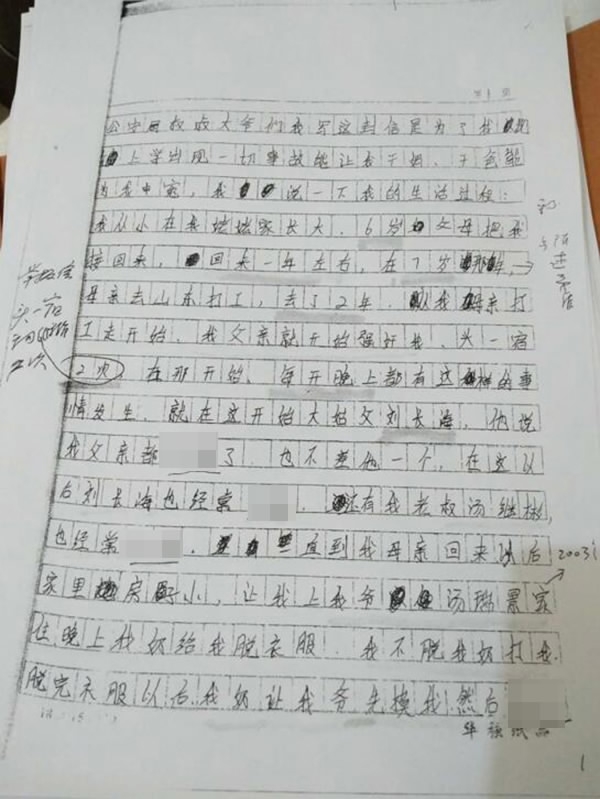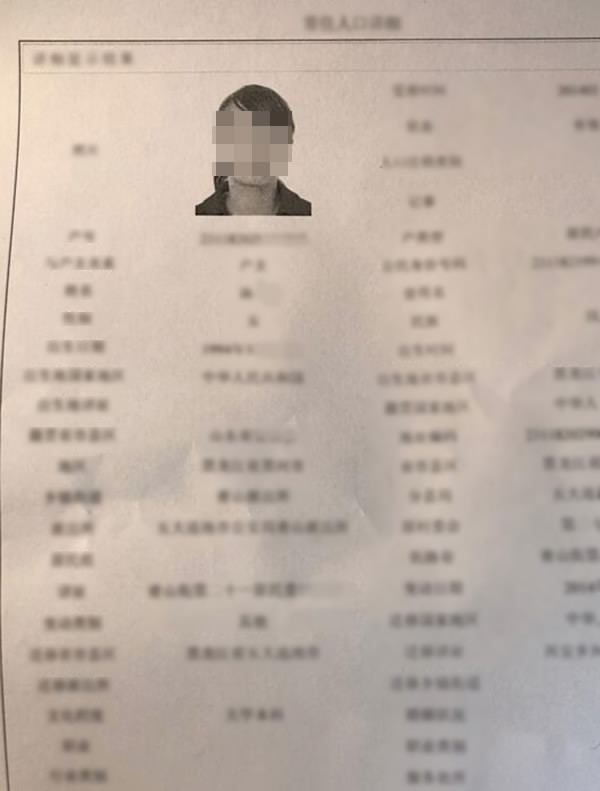
China
12:21, 03-Feb-2018
Chinese netizens lash out at media over decade-old sexual abuse case
CGTN

A decade-old sexual abuse case has triggered an online war between Chinese netizens and journalists after the story was first reported on by The Paper and other Chinese media outlets in late January.
The reports enraged many netizens because they thought that the journalists were biased and infringed upon the privacy of Tang Lanlan, the case’s alleged victim.
In October 2008, 14-year-old girl Tang Lanlan (alias) wrote a letter to the local police station in Wudalianchi, Heilongjiang Province, claiming that she had been repeatedly raped and sexually abused for seven years by her own father, grandfather, uncles, teachers, the rural director and neighbors.

The letter written by Tang Lanlan in 2008 /Photo via sohu.com
The letter written by Tang Lanlan in 2008 /Photo via sohu.com
After investigation and subsequent arrests, 11 of the suspects were sentenced to prison for rape and forced prostitution. Tang’s father was given a life sentence while Tang’s grandfather reportedly died in prison after vomiting blood.
At present, 5 of the 11 suspects have been released, including Tang’s mother Wan Xiuling.
On Jan. 30, Shanghai-based news portal the Paper posted an article titled ”Looking for Tang Lanlan,” which caught the attention of Chinese netizens on the social media platform Sina Weibo.
“Junior high school student Tang Lanlan, at the age of 14, sent her whole family to jail,” the article began, reporting on the letter that started a police investigation into the case and lead to the arrest and prosecution of more than a dozen people.
The article has since been deleted, but copies of the article were widely spread on WeChat, China’s largest social media and instant messaging platform with 963 million monthly active users.
Various Chinese media outlets began asserting that there were inconsistencies in Tang’s story. First, there are two versions of the victim’s medical reports, one of which may contradict the court’s final judgment. Second, all of the 11 suspects sought to appeal the judgment against them and denied all allegations, while the court remained with its original verdict during a second trial that took place at the end of 2012. Third, Tang had asked her aunt for money in exchange for not reporting her uncle.
Meanwhile, the Paper’s reporter Wang Le stirred controversy by traveling with Tang’s mother, Wang Xiuling, to interview relatives of some of the convicted, and uncovered a document that revealed details concerning Tang’s possible new address and identity.

The photo of a document revealing Tang's personal information including her possible new address /Photo blurred by CGTN
The photo of a document revealing Tang's personal information including her possible new address /Photo blurred by CGTN
The story by the Paper caused outrage among Chinese netizens.
Many have criticized the media for standing by the suspects and possibly revealing personal information that may expose the victim to danger.
“The public security authorities change the name and identity of the child, and then it’s the media who start a ‘human flesh search’ and reveal her identity – who would have expected this?” one online user said.
On Feb. 1, authorities in Wudalianchi city made a public statement, saying, “After the release of Wan Xiuling, she continuously petitioned non-designated departments. In addition, and with the aid of a few media sources, she involved herself in a publicity stunt and pressured the local police and legal departments in order to reverse the verdict.”
Authorities also urged netizens to keep an open mind when it comes to media reports.

SITEMAP
Copyright © 2018 CGTN. Beijing ICP prepared NO.16065310-3
Copyright © 2018 CGTN. Beijing ICP prepared NO.16065310-3